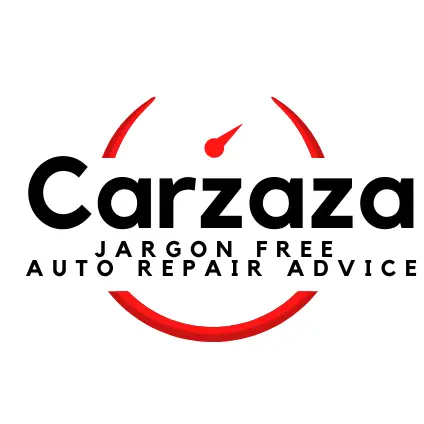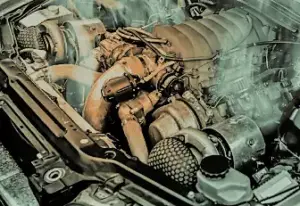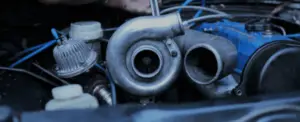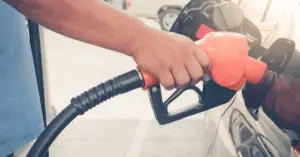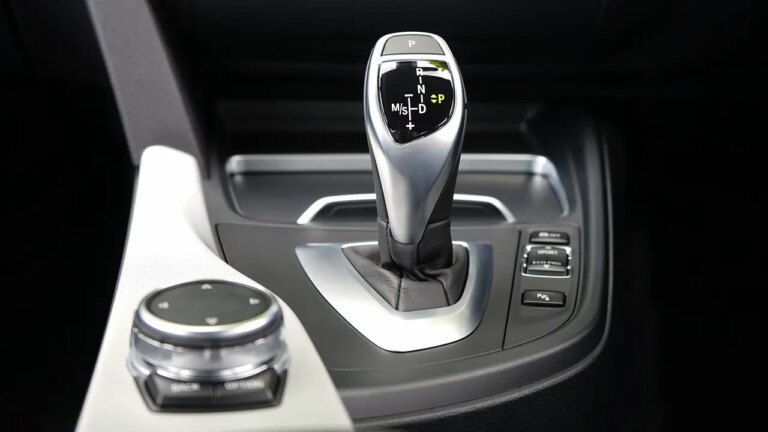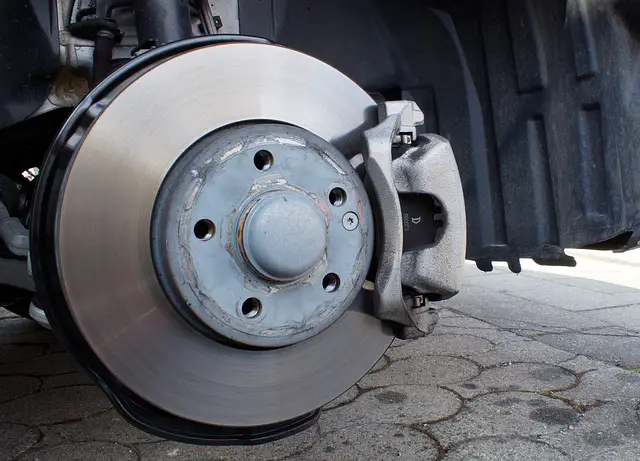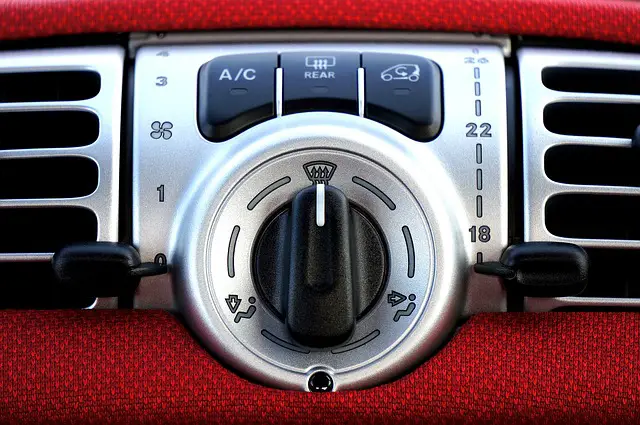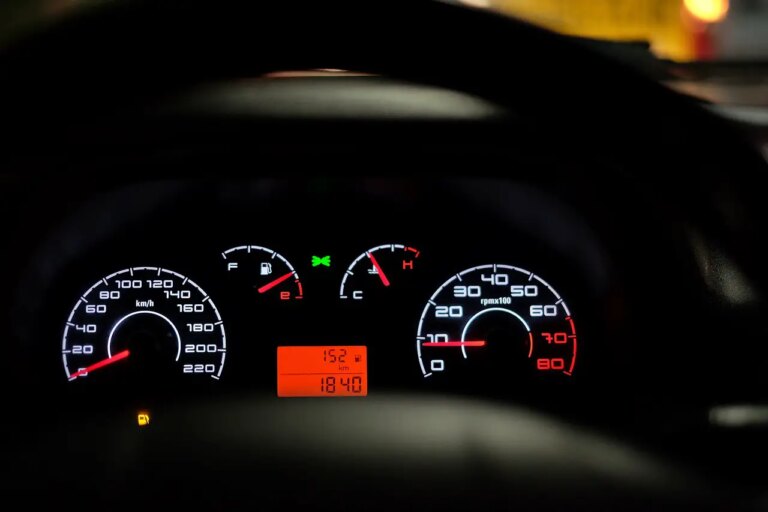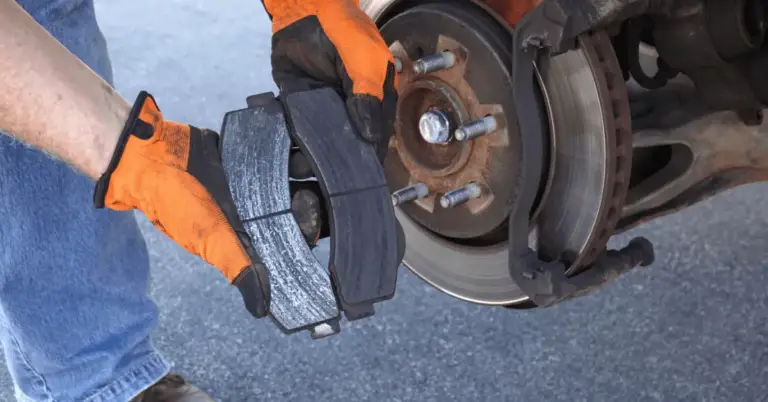Acceleration forces your car to burn fuel faster, so anything that stops this from happening can cause a car to sputter.
If you’re pulling out from an intersection or overtaking another car, and your car starts sputtering, this can prove dangerous. Because of this, it’s not a repair that should be postponed.
One of the most frequent reasons for a sputtering engine when accelerating is a problem with the fuel system of the car, specifically the filter, pump, and injectors. Together, these three vital parts ensure that gasoline moves freely from the fuel tank to your car’s fuel injectors and then evenly sprays it into the engine.
There are many other issues, however,
Here We Look At The Reasons Your Car Is Sputtering
1. Mass Airflow Sensor (MAF).
The main causes of car sputtering are restricted gas flow to the engine or the failure of the gas to ignite.
The Mass Airflow Sensor is different from most potential faults as it controls the air getting into the engine.
It transmits and receives signals from and to the car’s ECU. This computer tells the fuel injectors how to deliver the right amount of fuel at the correct time for the desired mixture.
An incorrect MAF sensor reading can cause your car to send an error message to the ECU, allowing more or less air into your engine. In extreme cases, this can lead to slow acceleration and rapid speed changes as the sensor send conflicting signals to the ECU.
You can purchase specific cleaners to fix your MAF. A can of cleaner should not cost more than $15.
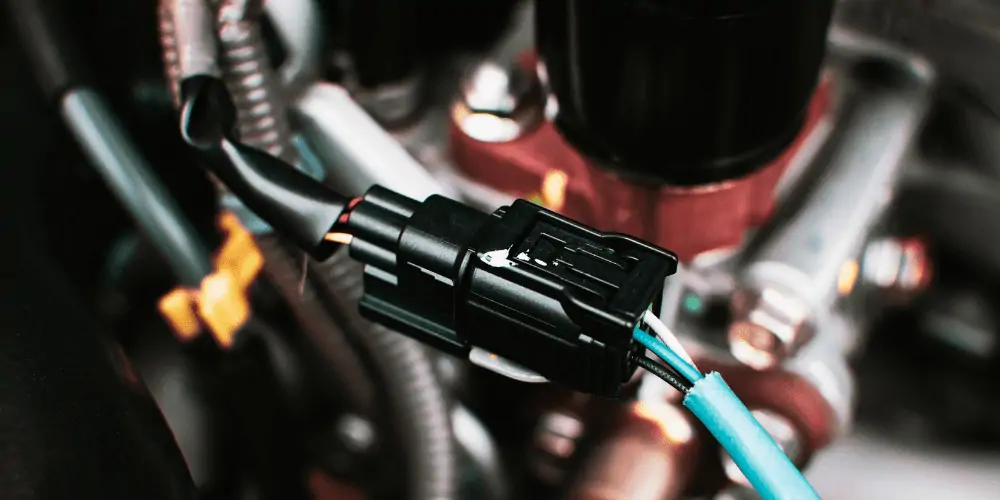
If you can’t effectively clean the MAF, it may be necessary to have it replaced.
You can expect to pay $150, including fitting for a new one.
2. Spark Plugs That Are Dirty or Damaged
Bad spark plugs or dirty ones can lead to an engine not turning properly. This could cause a misfire. You may feel your vehicle shaking when you accelerate or sputtering while driving.
Your spark plugs may have become worn and cannot ignite the fuel quickly enough. There are four spark plugs in most cars. One bad or broken spark plug can cause your car to have poor performance issues.
Your car may not be able to accelerate as fast due to this. It is easy to replace or repair spark plugs and is very affordable.
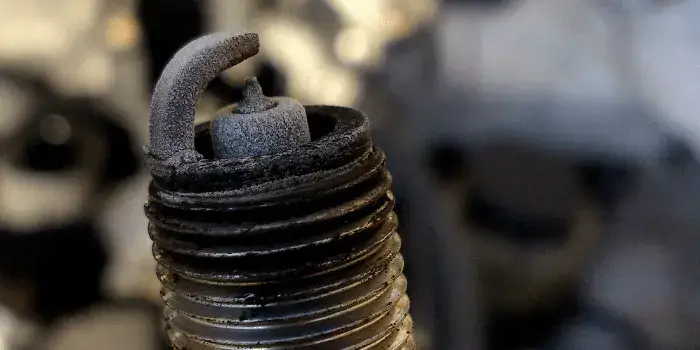
It would be best to buy genuine spark plug brands as they will last longer and provide years of trouble-free driving.
A brand-new set of four plugs is always better than one. It’s possible that all the plugs were previously installed at once, so all the other ones may fail at around the same time.
A set of good spark plugs should cost between $150 and $300, including fitting. If you wish to install them yourself, you will need a few specialized tools – which you may have already, including a socket wrench, torque wrench, gap tool, and pinchers.
3. Dirty Fuel Injectors
Dirty fuel injectors are one of the reasons why your acceleration can be sputtery. The fuel injectors are responsible for the fine spray of fuel that spark plugs ignite.
They can cause the cylinder to malfunction if they become clogged with dirt, carbon, or other deposits. This can lead to sputtering. This could be why you are experiencing a lack of performance when you press down on the accelerator pedal.

You can add fuel injection cleaners to your gas. These cleaners work by removing carbon deposits and other contaminants. How effective the cleaner is, depends on how clogged your fuel injectors have become.
Although most fuel injectors last for around 100,000, they can fail sooner if your car isn’t serviced frequently.
This is a good idea to try to clean your injectors before you replace them, as this costs around $700-1,500.
It costs only $10 to buy the additive to try to clean your fuel injectors instead, so great risk, reward odds
4. Gas Lines Damaged
Metal fuel lines control the flow of gasoline through the engine. They can leak or become damaged and cause the car’s pressure to drop, causing it to sputter.
You would be aware that the gas lines in your car are damaged. You’d probably smell gas around your car. You might have noticed gas under your vehicle.
It would also affect fuel efficiency. It would be best to fix your car as soon as you notice fuel lines leaking or damaged. This could prove to be very dangerous.
This is a quick fix and not expensive. You will not pay more than $150
5. Catalytic Converter Blocked
Your catalytic converter could be affected by a blockage. The catalytic converter is part of the exhaust system and collects harmful gases to stop them from escaping into the atmosphere.
A blockage occurs when the air-fuel mixture passing through your catalytic converter becomes too rich.
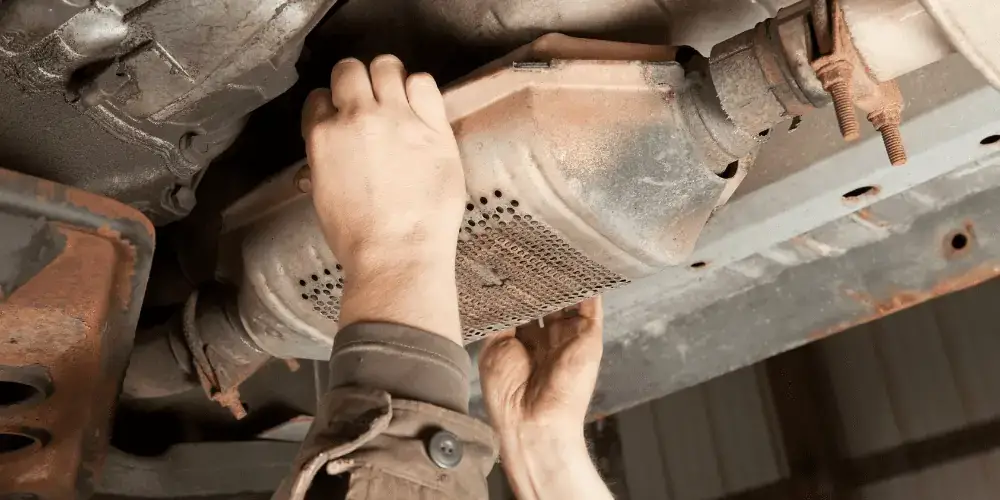
The good news is that this is not likely the problem, as a separate warning lamp would normally show on your dashboard to alert you to any impending problems with the catalytic converter.
It is possible to clean it using a high-quality catalytic converter cleaner. They don’t always work, though.
New Catalytic Converter Smell – Dangers, Causes, and Fixes
A new catalytic converter, which can cost anywhere from $500 to $1500, plus the cost of fitting, is required if it cannot be cleaned.
These are very expensive as the cat uses Platinum, Palladium, and Rhodium. These rare elements catch particulates before they travel down to the exhaust.
Other symptoms include an unpleasant smell from the exhaust or decreased fuel efficiency
6. Damaged Acceleration Cables
Most cars don’t have accelerator cables anymore and instead have electronic throttle management systems.
However, the ones with a cable that runs from the pedal to underneath the hood increases the amount of gas released when you press the gas pedal.
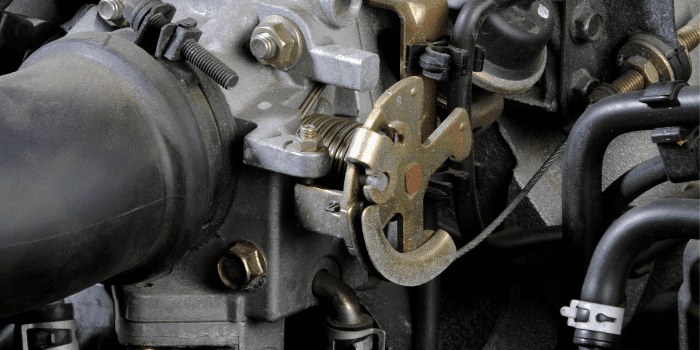
The cable won’t respond as well if it is damaged. You may experience slow or no response from your car. This should be very easily noticeable.
Other symptoms that indicate a loose accelerator cable include a stiff pedal, hard depressing, or slack feeling.
It’s a very inexpensive fix but unlikely to be the reason your car isn’t accelerating.
7. Defective Carburetors
Carburetors control how much fuel and air are mixed before the engine turns on. Carburetors that are damaged can cause acceleration problems and poor performance.
The number of jets in your car’s carburetor will vary depending on the model. These jets control the fuel flow in different sections of your carburetor.
Over time, carbon deposits can build up and cause problems with engine performance. A good carburetor cleaner will eliminate any dirt or grime blocking the jets. A spray can of the cleaner will cost you $20 approximately.
The carburetor might need to be replaced on rare occasions. This can be very expensive.
8. Dirty Air Filter
Air filters are the car’s first defense against dirt, dust, and other foreign particles.
Dirty filters can cause engine problems and allow dust into the engine. It’s a good idea to check the air filters every time your car is serviced.
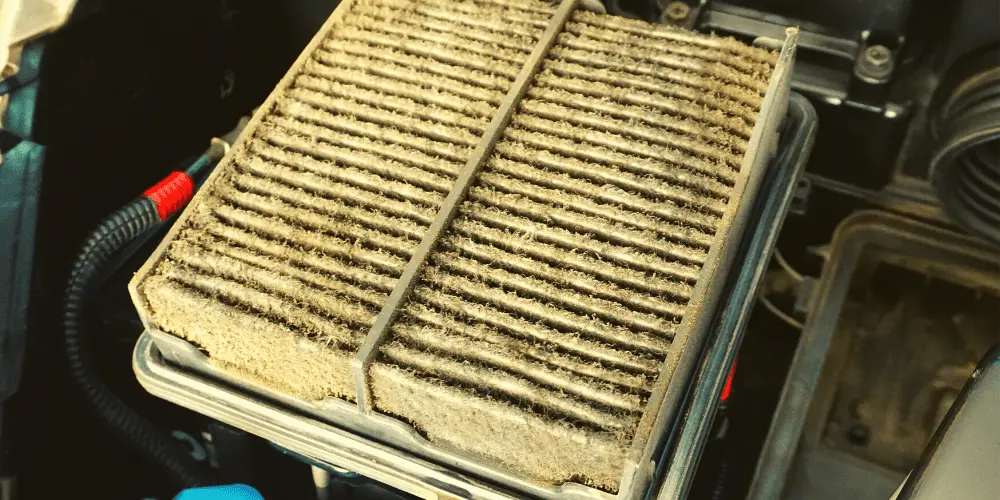
However, it may be worthwhile if it has been a while.
This is a very cheap part, but you may be able to clean the filter instead of replacing it.
An air filter replacement costs around $30 and is straightforward to fit. Take the old one out and replace it with the new one.
This should resolve the issue, and your car will start to accelerate more easily.
Clean filters can significantly increase the life expectancy and performance of your car’s engine.
9. Broken Distributor Cap
The distributor cap is part of the car’s fuel system. It houses the spark plugs. On cold days, condensation can build up underneath it. This can cause sputtery acceleration.
This often happens if the car is left outside overnight and not when kept in a garage.
This is easy to find out what the problem is. You can open most distributor caps to access the inside.
Check for moisture once inside and wipe it off with a cloth and WD40.
Although the problem will go away once the water is dried, it can cause engine damage if it happens a lot.
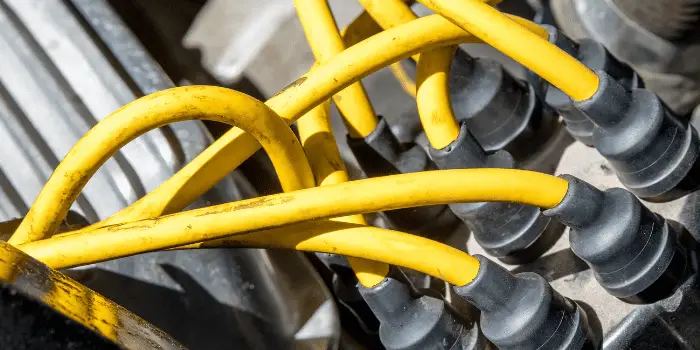
A thermal cover, which can reduce a condensation risk, is an option if you can’t park your car in a garage or other shelter, especially if you expect colder temperatures.
If you see condensation, replace the distributor cap if it is cracked or broken. This job is easy to do by yourself without the need for expert knowledge or tools.
Replacement distributor caps cost between $30 and $125.
Other visitors read this next: Why Is There a Rattle When I Accelerate? [Help & Advice]
In Conclusion
One of the most likely reasons for a sputtering engine is a fault with the fuel system of the car, specifically the filter, pump, and injectors. Together, these three key parts ensure that gas moves smoothly from the fuel tank to your engine’s fuel injectors and then precisely spray into the engine.
Rattling noises when you press hard on the accelerator pedal has other causes. Our recent article explains all: Why Is There a Rattle When I Accelerate?
